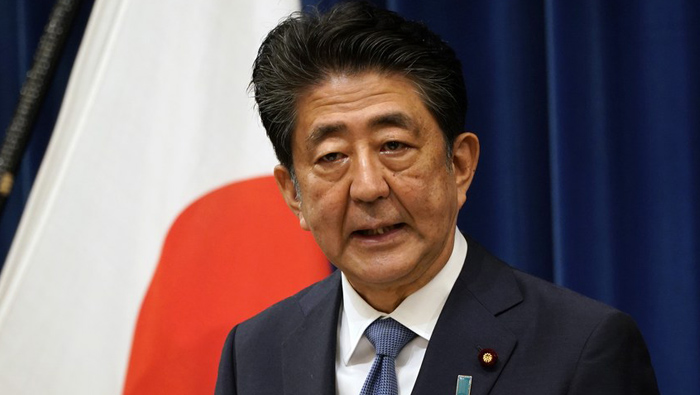
Tokyo: Japanese Prime Minister Shinzo Abe announcing on Friday he would step down from his post due to the recurrence of the same intestinal disease that ended his first tenure has caught public and political circles somewhat off-guard while posing a number of uncertainties ahead for the nation.
There was no doubt medical professionals had been paying close attention to the 65-year-old leader, as regular visits by Abe to hospital had not gone unnoticed, particularly two within a week recently, the first of which involved tests lasting seven-and-a-half hours.
Rumours had hence been swirling about Abe's health, but had been largely downplayed by senior officials, even just hours before Abe's nationally-broadcast news conference Friday at which he confirmed his time at the top had come to an end.
"Abe's health status remains unchanged," Japan's top government spokesperson Chief Cabinet Secretary Yoshihide Suga said.
"The prime minister himself has said he would like to work hard again from now on, and I'm seeing him every day and his health status remains unchanged," Suga said, just hours before Abe delivered the surprising news he was stepping down.
Similarly, when informing the leader of the ruling Liberal Democratic Party's junior coalition partner Komeito, Natsuo Yamaguchi, of his decision to step down, again just hours before the national TV conference, Yamaguchi said the news came "completely out of the blue."
But retrospectively, the severity of Abe's illness, an intestinal disease known as ulcerative colitis, may well have been evident in the build-up to him stepping down.
Abe's admission to hospital on August 17 came a day after former economy minister Akira Amari told a TV programme that the prime minister needs to rest, intimating he may be suffering from exhaustion, one of the causes of ulcerative colitis, along with stress.
Amari, who is close to the prime minister, said that Abe felt guilty about the idea of taking a break and that those around him needed to force him to get rest, if only for a few days.
Abe was back in the Keio University Hospital just one week later, this time for a more than four hours check up and further tests.
Even Deputy Prime Minister Taro Aso said that it was not a surprise that Abe was in "rough shape" as he had worked for 147 consecutive days through June 20 without taking a break, but suggested this was par for the course for Abe, known for his solid work ethic.
Going back to July 6, a weekly magazine even reported that the prime minister had vomited blood at his office, which first sent the rumors about his ill health swirling.
Nevertheless, political analysts said they were still shocked at the sudden news.
"This is a surprise ... We can expect a period of uncertainty now until the successor is determined," said Liu Jie, professor of graduate school of Asia-Pacific Studies at Waseda University.
Expected or not, uncertainty or not, Abe, who on Aug. 24, the same day he revisited the hospital for the second time in a week, became the nation's longest-serving leader with the most consecutive days in office at 2,799, told the nation on Friday that his time at the helm had come.
He said that the same intestinal disease that abruptly curtailed his first tenure as prime minister in 2007, having only entered office in late September 2006, had struck again with a vengeance, to the extent that, as he put it, it had become hard for him to make "sound judgements due to illness" and making way for a new leader was the best, if not only way forward.
Abe's resignation, while not being an insurmountable problem for the ruling camp, does pose some uncertainties ahead and poignant questions more immediately, with the main one being who will succeed Abe as the nation's leader. A question Abe repeatedly declined to answer during the press conference on Friday.
"The big question here is how they decide his successor," said Tomoaki Iwai, a political science professor at Nihon University. Xinhua